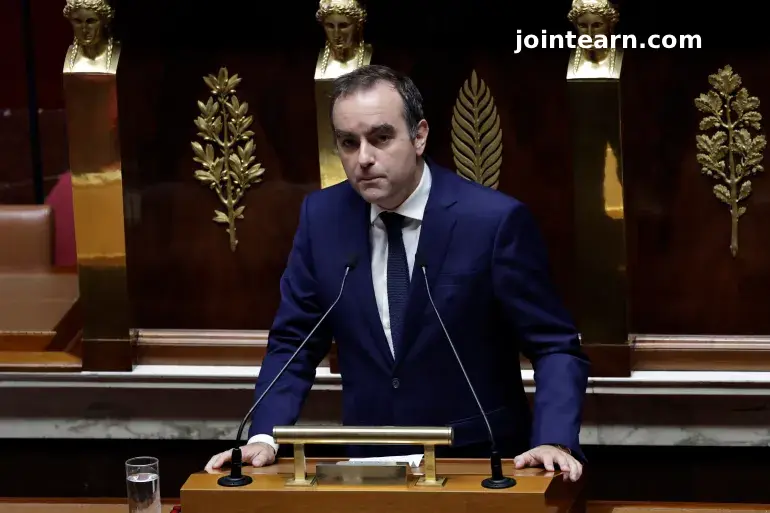
Paris, France — French Prime Minister Sébastien Lecornu has narrowly survived two no-confidence motions in Parliament, giving President Emmanuel Macron’s government a brief reprieve amid ongoing political turmoil. Lecornu, who only recently reshuffled his cabinet, must now steer through a divisive 2026 austerity budget to avoid another political crisis.
Far-Right and Far-Left Motions Fail
The two no-confidence motions were brought by both ends of France’s political spectrum — Marine Le Pen’s far-right National Rally (RN) and Jean-Luc Mélenchon’s far-left France Unbowed (LFI).
The RN’s motion was soundly defeated, receiving only 144 votes in the 577-seat National Assembly, far short of the 289 needed for a majority. Earlier, the LFI-led motion had gained 271 votes, just 18 short of the threshold.
The narrow margins underscore the fragile state of Macron’s centrist coalition, which lacks an outright parliamentary majority. Lecornu’s survival was secured largely thanks to the Socialist Party (PS), whose lawmakers withheld their votes in exchange for his pledge to suspend the controversial 2023 pension reform that would raise the retirement age from 62 to 64.
Socialists Offer Conditional Support
While the Socialists’ decision saved Lecornu’s government, PS lawmaker Laurent Baumel made clear that their support was not unconditional:
“Sparing the prime minister was in no way a pact for the future,” Baumel said, urging Lecornu to make “new concessions” during upcoming budget negotiations.
Yaël Braun-Pivet, President of the National Assembly and a close ally of Macron, struck a more optimistic tone:
“There is still a majority in the Assembly working in the spirit of compromise and responsibility,” she said after the votes.
Lecornu Faces Uphill Battle Over Austerity Budget
Having survived the confidence challenge, Prime Minister Lecornu now turns his attention to France’s 2026 budget, which includes major spending cuts aimed at reducing the country’s soaring public debt.
France’s debt-to-GDP ratio is the third highest in the European Union, behind only Greece and Italy, and stands at nearly double the EU’s 60 percent ceiling. The European Commission has pressured Paris to rein in spending or risk financial sanctions.
Lecornu, who became France’s fifth prime minister in less than two years, has vowed not to use Article 49.3 — the controversial constitutional tool Macron relied on to bypass Parliament in recent budgets.
“The government will make proposals, we will debate, and you will vote,” Lecornu promised lawmakers on Tuesday.
However, many analysts doubt he can pass the budget through an Assembly so sharply divided between the far left and far right.
Political Turmoil and Macron’s Fragile Standing
The latest political showdown comes after months of unrest in France, including mass protests over pension reforms and the collapse of multiple governments. Lecornu had briefly resigned last week amid criticism of his first cabinet lineup, only to be reappointed days later by Macron.
According to Al Jazeera’s Natacha Butler, Lecornu’s escape from the no-confidence votes offers “a reprieve, but far from a resolution.”
“He’s now facing a very difficult few weeks, trying to push through a cost-cutting budget that will satisfy both his allies and his opponents,” Butler said from Paris. “He doesn’t have a majority and is relying on individual MPs who don’t necessarily share his agenda.”
Both the far-right and far-left blocs have already pledged to block the government’s fiscal plans and are calling for new national elections.
Le Pen accused lawmakers of avoiding elections out of “terror,” saying she was “waiting with growing impatience” for Parliament’s dissolution — which could pave the way for her party’s best chance yet to win power ahead of the 2027 French presidential election.
European and Global Implications
Lecornu’s survival also spares Macron — for now — from having to call snap elections that could hand victory to the National Rally. But political analysts warn that continued instability could weaken France’s credibility in the EU and damage Macron’s international standing.
The French president already faced ridicule earlier this week when US President Donald Trump made light of France’s political troubles during a visit to Egypt for the Gaza ceasefire summit.
Macron’s government, described by many as “fragile and fatigued,” remains under intense domestic pressure to restore stability after last year’s snap elections backfired, producing a hung Parliament and emboldening both extremist blocs.
What’s Next for Lecornu?
While Lecornu has bought himself time, his next test looms large: passing the 2026 budget before year’s end. Failure to do so could trigger yet another no-confidence vote — and potentially force Macron to dissolve Parliament.
If that happens, analysts say, France could swing sharply to the right, reshaping its political landscape ahead of 2027. For now, Lecornu’s government has survived — but the battle over France’s economic future has only just begun.


Leave a Reply